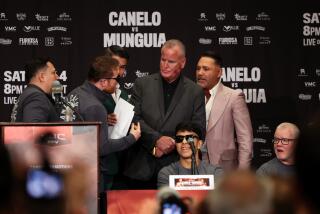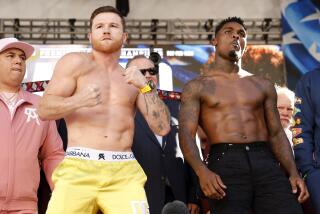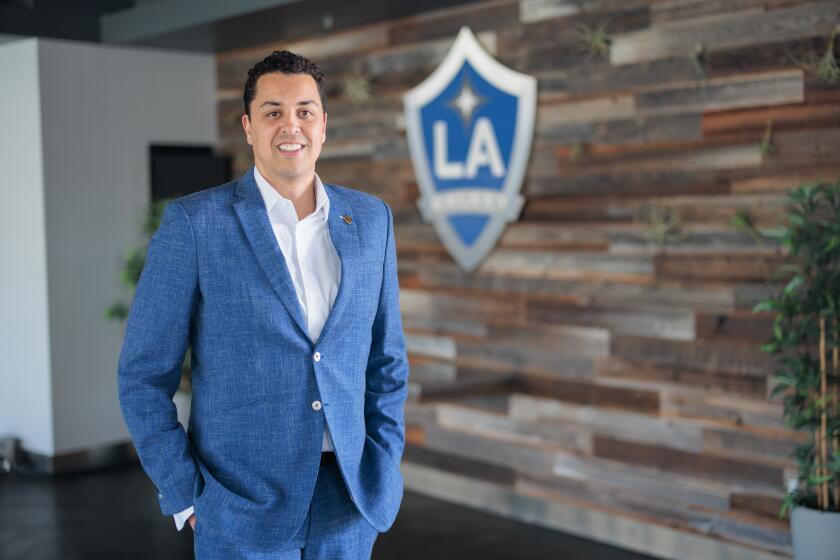Oscar Still Welter Belter
LAS VEGAS — Oscar De La Hoya had already been down once. His left eye was badly swollen. His lead on the scorecards was slim. His position among boxing’s unbeaten was precarious at best.
For the first time in his boxing life, De La Hoya had to look into the abyss of defeat, take a deep breath and prove that his heart is as big as his hype.
It was the start of the 12th and final round of Saturday’s World Boxing Council welterweight title fight between De La Hoya, the champion, and Ike Quartey, the challenger.
De La Hoya never hesitated, responding to the most pivotal moment in his career by showing the character some had questioned and going after Quartey and knocking him down to pull out a split decision at the Thomas & Mack Center.
Seconds after the traditional slapping of gloves to start the final round, De La Hoya ducked a Quartey right hand and landed a solid left that floored the previously unbeaten Quartey (34-1-1, 29 knockouts), the former World Boxing Assn. welterweight champion from Ghana.
Quartey, who had previously been down in the sixth round, got up, but De La Hoya, who might have figured he could coast through the rest of the round on the strength of that knockdown and play it safe, instead went right back after Quartey, catching up to him in Quartey’s corner.
There, De La Hoya unleashed his best attack of the night, connecting on 17 punches that left Quartey with shaky legs and an inability to come back as the final minutes ticked away.
“He just wouldn’t go down,” De La Hoya said.
But Quartey’s resolve and determination were not enough.
When it was over, the scorecards showed that judges Ken Morita of Japan (116-112) and John Keane of England (116-113) had given the decision to De La Hoya with Larry O’Connell of England awarding the fight to Quartey (115-114). The Times scored it 116-111 for De La Hoya.
“People want to see good action-packed fights, and I gave it to them,” De La Hoya said. “He had a great hook and a good left jab and he got me a couple of times with the right hand.”
It had been billed at the battle of jabs, Quartey possessing a jab that is considered the best in boxing by some while De La Hoya has won many fights with his own powerful jab.
Early in the fight, both men turned to their favorite weapon, but neither was able to establish an edge.
In the middle rounds, there was little if any action at times as both men retreated into a conservative fight plan, looking for an opening.
De La Hoya had talked all week about this being his first “true test” and it was obvious he was determined not to fail it by exposing himself to Quartey’s power.
Quartey had concerns of his own. He hadn’t fought in 16 months, his last fight had ended in a draw with Jose Lopez knocking him down twice and Quartey later revealed that he was suffering from malaria at the time of that fight.
“Sometimes Ike fought and sometimes he wouldn’t,” De La Hoya said. “I thought he would try to come at me and overpower me, but he gave me some good lateral movement which I didn’t expect.”
In the sixth round, both fighters abandoned their conservative chess game and started playing hardball.
De La Hoya (30-0, 24 knockouts) landed the first telling blow, knocking Quartey down with a roundhouse left.
Quartey got right up and, before De La Hoya had time to enjoy his advantage, he found himself on the canvas, sent there by a short left hook from Quartey.
Quartey’s punch seemed to do more damage. De La Hoya was clearly hurt, as hurt as he has appeared since turning professional after the 1992 Olympics, where he won a gold medal.
De La Hoya hung on, stayed away, but clearly looked intimidated by Quartey.
Going into the 10th round, De La Hoya, even on two scorecards and behind on the other, needed a big finish to pull out the decision and he got it, winning the last three rounds on all the judges’ scorecards.
At least the judges thought De La Hoya had won the final three rounds. Quartey had a different view.
“You know I couldn’t win a fight by decision in Las Vegas,” he said, ignoring the fact that two of the judges were from England and the other was from Japan. “You saw the fight. I thought I did enough to win. He did nothing. He just tried to survive.”
“You have to respect Oscar as a champion. I thought I did enough to win and I surprised him with my boxing ability.”
Said Gil Clancy, De La Hoya’s trainer: “It was one of the greatest welterweight fights I’ve ever seen. He proved himself to be a great champion.”
Will there be a rematch?
“There are bigger and better fights out there,” De La Hoya said.
Not many.
More to Read
Go beyond the scoreboard
Get the latest on L.A.'s teams in the daily Sports Report newsletter.
You may occasionally receive promotional content from the Los Angeles Times.










